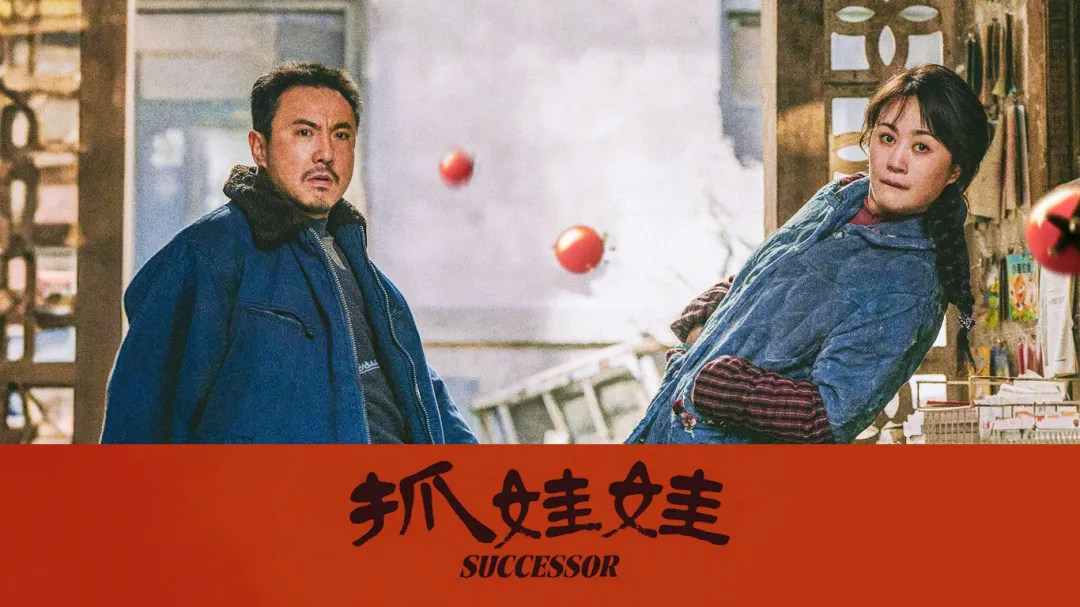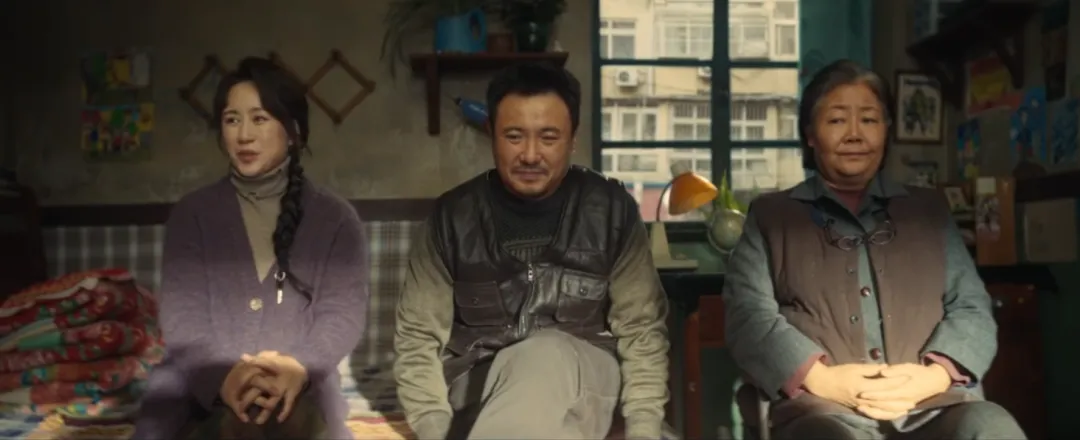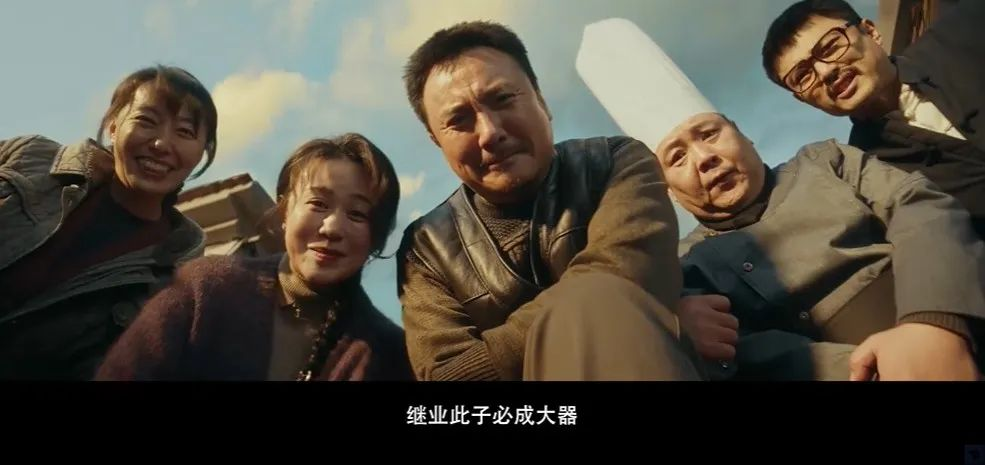主播:Flora(中国)+Erin(美国)
歌曲 :can you hear me? (by Munn)
今天我们来聊一聊最近的一部关于“中式教育”的电影——《抓娃娃》(Successor)。
01. 影片名《抓娃娃》和Successor
Successor意为“继承者”,指影片中父亲马成钢培养儿子马继业为自己的“继承者”。而“抓娃娃”则为“抓孩子”或者抓孩子的education(教育)。

02. 《抓娃娃》的影片内容
There was a tycoon(富翁) named Ma Chenggang who had two sons.
由于长子(his elder son)在优渥的条件下(under the favorable conditions)没多大成就,马成钢将此归咎于the living conditions were so good that he did not appreciate them(生活条件太好,所以他并不珍惜)。他觉得大儿子没能“成才”肯定是因为没有艰苦条件的磨炼。

Then he decided that he would make sure (决定要确保) that his youngest son would be admitted to Qingbei University (小儿子被清北大学录取) to fulfill the wish that he had not been able to fulfill at that time (实现他当时不能实现的愿望).
当时电影里频繁地出现“清北大学”估计就是暗示现实中国内的两所顶尖院校Tsinghua University and Peking University(清华大学和北京大学)了。They are the universities that not only many students but also many parents aspire to (不仅是很多学生也是很多父母向往的)。马成钢就是其中之一,他想让儿子满足this wish for him when he didn't get in himself (他自己未能实现的愿望)。

Ma Chenggang paid for a professional team (成立一个专业团队) to simulate his growth environment (模仿他的成长环境) in order for his son to be admitted to Qingbei University.
•be admitted to 被......录取
这和《楚门的世界》一样细思极恐,周围的人都是一群演员。你生活的方方面面都暴露在摄像头下。There are even people who are specializing in analyzing your micro-expressions (有人专门分析你的微表情).
• specialize v.专门研究(或从事)

在发现真相后,继业打算break free from his father's control(摆脱他父亲的控制),去实现他自己的抱负(to fulfill his own aspirations):成为一名long-distance runner(长跑运动员)。
其实,继业从小就喜欢长跑,但是后来因为父亲和周围的人都欺骗他,让他觉得他不适合这条道路,于是他就放弃了。
The last scene shows Jiye running a marathon (最后一幕是继业跑马拉松). This is supposed to be a cause for celebration (本来是值得庆祝的事). All's well that ends well (皆大欢喜).
But this is not fairy tale (童话故事). 他本来是第一名(He was originally in first place),但由于他以前developed habit of excessive frugality(养成了过度节俭的习惯),他看到空瓶子就想捡起来,等到捡完后,所有的选手都超过了他。

This reflects that his parents' previous wrong education methods (之前错误的教育方法) had already had a profound effect on him (对他产生了深刻的影响).
有很多网友都表示:这令人窒息的“中式教育”!Traditional Chinese-style education, it has been labeled as “authoritarian” (被贴上“独裁主义”的标签).
Authoritarian parenting (专制型教育) is a style of child-raising that emphasizes high standards (强调高标准) and a tendency to control kids (控制孩子) through shaming, the withdrawal of love, or other punishments (通过羞辱、撤回爱或其他惩罚).

But once people equalize Chinese education with authoritarian (一旦将中国教育等同于独裁主义), 必定会增加对中国教育的误解和偏见(misunderstanding and prejudice)。Because after all, not everything about Chinese education is negative (并不是关于中国教育的一切都是负面的).
• equalize v. 使相等
There are good aspects of traditional Chinese education, such as the importance that families place on cultivating a sense of frugality (培养节俭意识), self-reliance (自立) and filial piety (孝顺) in their children.

These are increasingly overlooked by modern youth (这些越来越被现代年轻人所忽视). 就像这次的抓娃娃电影,人们好像一提到中国式教育首先想到的就是suffering parenting, guilt-based parenting and control-based parenting(过度的苦难教育,内疚式还有控制式教育)。
People may have their reasons for interpreting it that way, but anyway they're not exactly the same.
• interpret v. 把……理解为
03. 一些错误的教育方法
(1)Suffering parenting(过度的苦难教育)
Suffering parenting refers to a form of education in which the recipient (受教育者) is made to undergo suffering (遭受痛苦) in order to improve his or her overall qualities (为了提高整体素质).
这种教育方式是的初衷其实是好的,它的目的是让受教育者的综合素质得到提升。For example, it's supposed to develop a sense of frugality(节俭意识) and resilience(抗压能力).

However, most of the so-called "suffering parenting" that exists nowadays is just a formality (现存的多数“苦难教育”仅停留于形式) and does not serve the purpose of education (与其教育初衷相违背).
It's fine to develop or improve his or her overall qualities, but life itself can give us that, or we can get it in other ways (生活本就可以给予我们这些,我们也可以通过其他方式获得).
也难怪很多人说:我的生活本来就很苦了,你还要给我制造这么多苦难?

Flora saw a video posted by a mom complaining about her daughter (视频关于一个母亲抱怨自己的女儿). 她带着女儿出去旅行,本可以给她买一张seat ticket(坐票),但她却intentionally bought a standing ticket(故意买了一张站票)。
They traveled for hours and her daughter cried the whole way (她们有几个小时的车程,女儿哭了一路).

What's even more unbelievable is that this mother is still complaining to the internet (这位母亲还在网络上抱怨) that her daughter doesn't understand her good intentions (说女儿不懂自己的良苦用心). What a terrible mindset!
(2)Guilt-based education (内疚式教育)
Guilt-based parenting is when parents control their children by making them feel guilty (通过让他们感到内疚来控制孩子) through showing weakness (通过表现出软弱) and complaining(抱怨) or even self-mutilation (甚至是自残).
其实内疚式教育就是以爱为名的情感绑架。它会让孩子产生sense of guilt(愧疚感)、增加mental stress(心理压力),削弱他们的self-esteem and self-confidence(自尊心和自信心)。
Some people call them toxic love (有毒的爱). 最经典的就是餐桌上的一句:我舍不得吃,都留给你吃。

(3)Control-based parenting(控制式教育)
It is when parents or educators control their children's lives, learning, socialization, and hobbies (控制孩子的生活、学习、社交和业余爱好) to achieve their goals (去实现他们的目标). 这类父母通常控制欲极强。
其实以上三种教育方式与exam-oriented education(应试教育)不无关系,比如电影里马成钢费尽心思其实就是想让继业考上清北大学。

04. Exam-oriented education(应试教育)
Exam-oriented education has received mixed reviews (评价褒贬不一).
这种教育体系可能不利于学生的all-round development(全面发展),but it is conducive to the popularization of basic knowledge(有利于基础知识的普及),而且选拔人才的成本较低。

05. Quality education (素质教育)
在西方,特别是在美国,高质量教育的重点是holistic development(全面发展),encouraging creativity(鼓励创造力)、critical thinking(批判性思维)和a broad array of extracurricular activities(广泛的课外活动)。This approach aims to develop well-rounded individuals (旨在培养全面发展的个人).
• a broad array of 各种各样的
• extracurricular /ˌekstrəkəˈrɪkjələr/ adj. 课外的

虽然素质教育的理念听起来很理想,但它并非没有挑战。One major concern is whether quality education can sometimes be overemphasized (有时素质教育会被过分强调).
• concern n. 担忧
• overemphasize /ˌəʊvərˈemfəsaɪz/ v. 过分强调
美国的top-tier universities(一流大学)的生源基本上是来自美国排名前100 的高中,但是在这里面public schools(公立学校)只有6所。The reality is that attending a private high school is often the most effective way to receive a quality education in the US (在美国,上私立高中往往是接受优质教育的最有效方式).
然而,the high tuition fees(高昂的学费)使得许多家庭望而却步。这可能会reducing social mobility(降低社会流动性)。

这可能会造成一个循环,只有那些能负担得起私立教育的人(those who can afford private education)才会继续dominate top university admissions(主要影响顶尖大学的录取率)。
When social mobility decreases(当社会流动性下降), 不同的社会经济阶层之间的差距(the gap between different socioeconomic classes)会扩大. This can lead to a society where opportunities are concentrated among the wealthy(这导致机会都集中在富人手里), 会限制多样性(diversity),延续不平等(inequality).

06. “An idealized education system (理想化的教育制度)”
It’s clear that both China and the US face unique challenges with their educational systems (中美的教育体系都面临着独特的挑战).
过分强调高质量教育(overemphasizing quality education)而像美国那样without addressing accessibility(不解决教育的可获得性),可能会exacerbate social divides(加剧社会分歧).
• exacerbate /ɪɡˈzæsərbeɪt/ vt. 使加重

Some people just blindly worship the western education system (一些人盲目崇拜西方的教育体系), 但每个教育体系都有自己的挑战,盲目照搬绝对是不可取的,适合自己的才是最好的。
China's education system, while making strides in popularizing basic education (尽管在普及基础教育方面取得了重大进展), still heavily focuses on academic performance (非常关注学业成绩). 这往往会给学生带来immense pressure(巨大的压力),并且overlooks the importance of holistic development(忽视全面发展的重要性)。
许多人担心中国教育的未来,并试图找到改变它的方法,有些人提出了很多宝贵建议,但有些很多建议是极端的。This is why we're doing this podcast to correct that (这就是我们想做这期节目来更正它的原因).

The key takeaway is that (关键的结论是) there is no one-size-fits-all solution (没有一刀切的解决方案). What we need is a balanced approach tailored to each country’s unique context (针对每个国家国情的平衡的方法).
It’s really about finding the middle ground—integrating (融合) the strengths of quality education (高素质教育的优势) with the rigor of traditional academic excellence (传统学术卓越的严谨性) while ensuring accessibility for all students (同时确保所有学生都有入学机会).
• rigor /ˈrɪɡər/ n. 严格

这种平衡的方法就像是我们说的“中庸”,可以帮助develop well-rounded individuals(个人全面发展),without compromising on inclusivity and equity(而不损害包容性和公平性)。
• compromise /ˈkɑ:mprəmaɪz/ v. 折中,妥协
请留言告诉我们:
你看了电影《抓娃娃》吗?对这部电影你有什么看法?



 583
583 1
1
